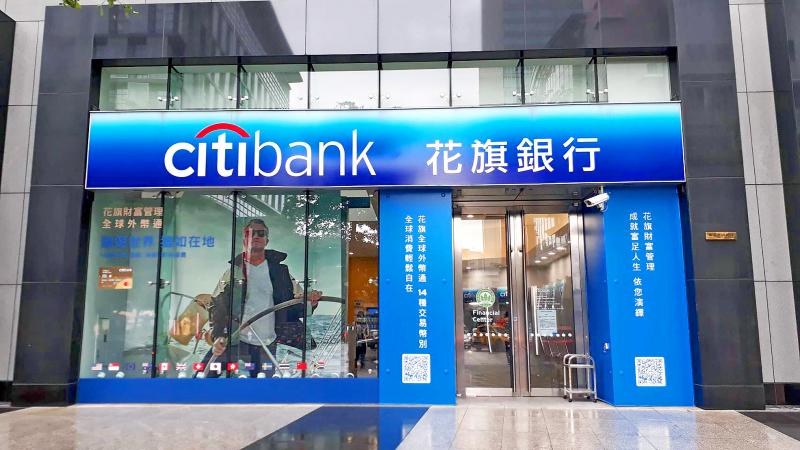As the COVID-19 pandemic drastically affects human health as well as the economy, Citigroup Inc is investing more than US$65 million in medical equipment to support frontline workers, while Citibank Taiwan Ltd (台灣花旗) is helping local families and healthcare workers.
Citigroup is passing the baton to Citibank Taiwan, which is matching dollar-for-dollar donations from its 4,000 employees nationwide, to help vulnerable families, orphans, single-parent homes and medical personnel nationwide.
Throughout the pandemic, Citibank Taiwan’s policy has been to provide its employees with a safe work environment, while continuing to provide the same level of service to its customers, Citibank Taiwan chairman Paulus Mok (莫兆鴻) said.

Photo courtesy of Citibank Taiwan Ltd
Although COVID-19 is winding down in Taiwan, many families in the nation have been hit with a drastic reduction in their income due to the pandemic’s economic effects. Affording tuition and even basic daily necessities has become a challenge for many families.
To help these families, as well as doctors on the front line, Citibank Taiwan has teamed up with nonprofit organizations the Mustard Seed Mission, the Taipei Orphan Welfare Foundation and Doctors Without Borders.
More than 35 percent of the nation’s vulnerable families are facing reduced salary, unpaid leave or even unemployment as a result of the pandemic, the Mustard Seed Mission said.
The mission thanked Citibank for its efforts to raise funds and rally 170 food banks to provide families with daily necessities including rice, noodles, canned goods, cooking oil and soap.
Working with the Taipei Orphan Welfare Foundation, Citibank aims to raise funds to help children in single-parent homes pay for tuition, as their ability to do so might have been limited by the pandemic, the bank said.
As the pandemic has not yet slowed in much of the world, Citibank also hopes that working with Doctors Without Borders could help doctors slow the spread of the disease.
Citibank employees nationwide have donated funds to subsidize the purchase of medical equipment for doctors in vulnerable areas.
The bank would continue its fundraising efforts to help disadvantaged families in Taiwan and to help purchase medical equipment for frontline doctors until the end of August, and Citibank would continue to match all donations made by employees nationwide.
“Let’s put our heart into this, and join hands to build a post-epidemic world of caring, Citibank said.

UNCERTAINTY: Innolux activated a stringent supply chain management mechanism, as it did during the COVID-19 pandemic, to ensure optimal inventory levels for customers Flat-panel display makers AUO Corp (友達) and Innolux Corp (群創) yesterday said that about 12 to 20 percent of their display business is at risk of potential US tariffs and that they would relocate production or shipment destinations to mitigate the levies’ effects. US tariffs would have a direct impact of US$200 million on AUO’s revenue, company chairman Paul Peng (彭雙浪) told reporters on the sidelines of the Touch Taiwan trade show in Taipei yesterday. That would make up about 12 percent of the company’s overall revenue. To cope with the tariff uncertainty, AUO plans to allocate its production to manufacturing facilities in

TAKING STOCK: A Taiwanese cookware firm in Vietnam urged customers to assess inventory or place orders early so shipments can reach the US while tariffs are paused Taiwanese businesses in Vietnam are exploring alternatives after the White House imposed a 46 percent import duty on Vietnamese goods, following US President Donald Trump’s announcement of “reciprocal” tariffs on the US’ trading partners. Lo Shih-liang (羅世良), chairman of Brico Industry Co (裕茂工業), a Taiwanese company that manufactures cast iron cookware and stove components in Vietnam, said that more than 40 percent of his business was tied to the US market, describing the constant US policy shifts as an emotional roller coaster. “I work during the day and stay up all night watching the news. I’ve been following US news until 3am

COLLABORATION: Given Taiwan’s key position in global supply chains, the US firm is discussing strategies with local partners and clients to deal with global uncertainties Advanced Micro Devices Inc (AMD) yesterday said it is meeting with local ecosystem partners, including Taiwan Semiconductor Manufacturing Co (TSMC, 台積電), to discuss strategies, including long-term manufacturing, to navigate uncertainties such as US tariffs, as Taiwan occupies an important position in global supply chains. AMD chief executive officer Lisa Su (蘇姿丰) told reporters that Taiwan is an important part of the chip designer’s ecosystem and she is discussing with partners and customers in Taiwan to forge strong collaborations on different areas during this critical period. AMD has just become the first artificial-intelligence (AI) server chip customer of TSMC to utilize its advanced

Six years ago, LVMH’s billionaire CEO Bernard Arnault and US President Donald Trump cut the blue ribbon on a factory in rural Texas that would make designer handbags for Louis Vuitton, one of the world’s best-known luxury brands. However, since the high-profile opening, the factory has faced a host of problems limiting production, 11 former Louis Vuitton employees said. The site has consistently ranked among the worst-performing for Louis Vuitton globally, “significantly” underperforming other facilities, said three former Louis Vuitton workers and a senior industry source, who cited internal rankings shared with staff. The plant’s problems — which have not